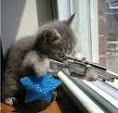The author, Herbert McBride, was an interesting fellow. He clearly was eager to go to war, somewhere, as he wrote that he tried to get into the Boer War and the intervention into Mexico, both without success. When World War I broke out he had to have been in his early 40s, yet he went to Canada and enlisted. He fought in France until he was medically discharged in 1917 for what appeared to be a combination of battle wounds and shell shock.
Two decades or so before the war, he was living and working in Colorado to get over a case of tuberculosis. Working as a cowboy and for a coal company, he became acquainted with some of the famous gunfighters of the Old West:
From these men I learned many things, the most important of which was the point which they all insisted was absolutely vital: the ability to control one's own nerves and passions--in other works, never to get excited.(pg. 5)
If you want a cold, unsentimental yet proud look at life in the trenches, then the book is well worth reading.
If you have ever seen the somewhat execrable movie "Enemy at the Gates", you might recall a scene where Vasilii Zaitsev is talking about the unnatural actions of a German sniper in not relocating after reach shot. McBride machine-gunned a German sniper who didn't move after firing; he saw where a litter party was shot down and was able to triangulate back to a likely firing point.
McBride believed that the problems that occurred with the Ross rifle were due to substandard ammunition that was made in the rush to ramp up production for the war. He hinted at a manufacturer on the Hudson River, "National something or other", which unless he was referring to the Watervliet arsenal, I have no clue as to who he meant.
Update: National Conduit and Cable Co., Hastings-on-Hudson, NY.

No comments:
Post a Comment